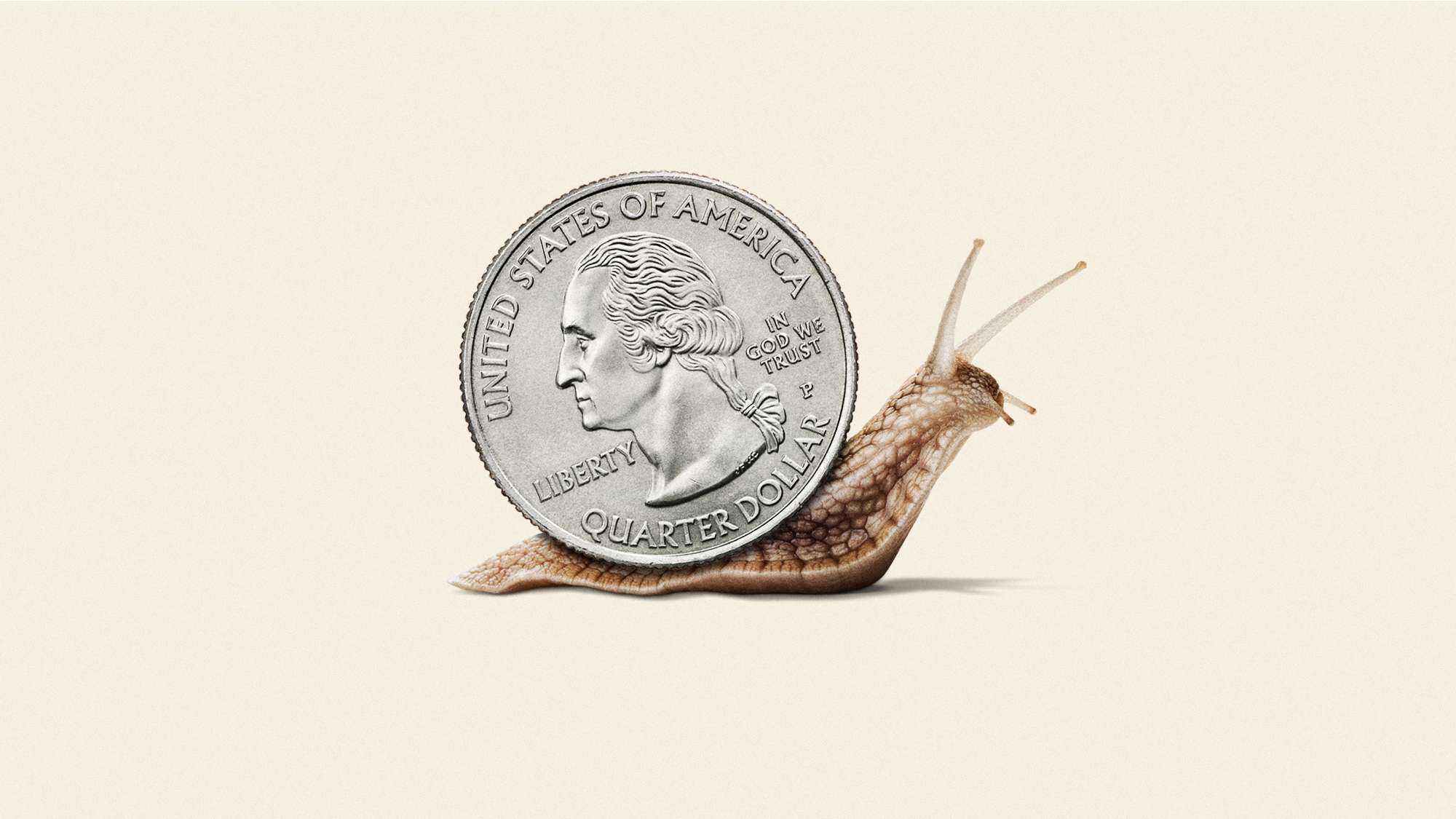Why is the threat of stagflation rising?
Inflation is sticky. Trump's tariffs won't help.


A free daily email with the biggest news stories of the day – and the best features from TheWeek.com
You are now subscribed
Your newsletter sign-up was successful
It's a word not often heard in America since the 1970s: stagflation. The term describes a triple-whammy of terrible economic conditions — high unemployment, low growth and supercharged inflation. Now some economists are warning that a new era of stagflation could be on the horizon.
President Donald Trump's economic policies risk the "worst of all possible worlds: a kind of stagflation," Nobel-winning economist Joseph Stiglitz said to The Guardian. Trump's "on-off tariff plans" and "apparent contempt for the rule of law" will make businesses less likely to invest. The sudden cancellation of U.S. government programs and contracts will create further uncertainty, he said, and will likely produce "inflation, and a weak economy." Without a course change, "I could certainly see a scenario where we get to stagflation," Stiglitz said.
'High inflation and very slow growth'
The last era of American stagflation occurred "when oil prices spiked during the Arab oil embargo" during the 1970s, CNN said. The era left an imprint on many of today's economic policymakers. "It was 10% unemployment," Federal Reserve Chair Jerome Powell said during a speech in May. "It was high-single-digits inflation and very slow growth." The Fed ultimately defeated stagflation with bitter medicine: It "aggressively" raised interest rates and triggered a painful recession during the early 1980s, CNN said.
The Week
Escape your echo chamber. Get the facts behind the news, plus analysis from multiple perspectives.

Sign up for The Week's Free Newsletters
From our morning news briefing to a weekly Good News Newsletter, get the best of The Week delivered directly to your inbox.
From our morning news briefing to a weekly Good News Newsletter, get the best of The Week delivered directly to your inbox.
New reports showing inflation rising back to 3% make the current moment feel like a "light version of the 1970s," Edward Harrison said at Bloomberg. It's now clear that inflation is sticky — "price moderation" bottomed out in September — and the Trump administration's "seriously inflationary policies" will only add to the upward price pressure. Today's inflation numbers "may be lower today" than they were 50 years ago, but the trend lines are similar. That presents a big challenge to Powell, who "doesn't want to be remembered as the next Arthur Burns, the Fed Chair during the mid-1970s stagflation," said Harrison.
There is "anxiety among economists" about a new era of "stagflation-lite," said MarketWatch. The Trump administration's tariff announcements "make it harder for business to invest," while the promise of mass deportations could "dry up" the labor pool, forcing businesses to raise wages. The "remaining wild card" is spending — "sharp cuts" to the federal budget would produce "another drag on the economy." As a result, "stagflation-lite is a really useful phrase to describe what could happen," said Capital Economics' Paul Ashworth.
Tariffs could be key
Trump's tariff maneuvering could decide what happens next. He announced 25% tariffs on imports from Mexico and Canada at the beginning of February, only to delay their implementation by 30 days. If they do go into effect, analysts at Wells Fargo expect the United States GDP "growth would slow" even as inflation expectations would tick up, said Sourcing Journal. That could change if there are carve-outs for certain product categories, or if the tariffs are only temporary. But persistent, widespread tariffs could lead to an ugly formula: "Negative growth along with an inflation boost equals stagflation."
A free daily email with the biggest news stories of the day – and the best features from TheWeek.com
Joel Mathis is a writer with 30 years of newspaper and online journalism experience. His work also regularly appears in National Geographic and The Kansas City Star. His awards include best online commentary at the Online News Association and (twice) at the City and Regional Magazine Association.
-
 How the FCC’s ‘equal time’ rule works
How the FCC’s ‘equal time’ rule worksIn the Spotlight The law is at the heart of the Colbert-CBS conflict
-
 What is the endgame in the DHS shutdown?
What is the endgame in the DHS shutdown?Today’s Big Question Democrats want to rein in ICE’s immigration crackdown
-
 ‘Poor time management isn’t just an inconvenience’
‘Poor time management isn’t just an inconvenience’Instant Opinion Opinion, comment and editorials of the day
-
 Is the US in a hiring recession?
Is the US in a hiring recession?Today's Big Question The economy is growing. Job openings are not.
-
 Trump wants a weaker dollar, but economists aren’t so sure
Trump wants a weaker dollar, but economists aren’t so sureTalking Points A weaker dollar can make imports more expensive but also boost gold
-
 Did markets’ ‘Sell America’ trade force Trump to TACO on Greenland?
Did markets’ ‘Sell America’ trade force Trump to TACO on Greenland?Today’s Big Question Investors navigate a suddenly uncertain global economy
-
 Will Trump’s 10% credit card rate limit actually help consumers?
Will Trump’s 10% credit card rate limit actually help consumers?Today's Big Question Banks say they would pull back on credit
-
 Can Trump make single-family homes affordable by banning big investors?
Can Trump make single-family homes affordable by banning big investors?Talking Points Wall Street takes the blame
-
 How prediction markets have spread to politics
How prediction markets have spread to politicsThe explainer Everything’s a gamble
-
 What will the US economy look like in 2026?
What will the US economy look like in 2026?Today’s Big Question Wall Street is bullish, but uncertain
-
 Tariffs have American whiskey distillers on the rocks
Tariffs have American whiskey distillers on the rocksIn the Spotlight Jim Beam is the latest brand to feel the pain
